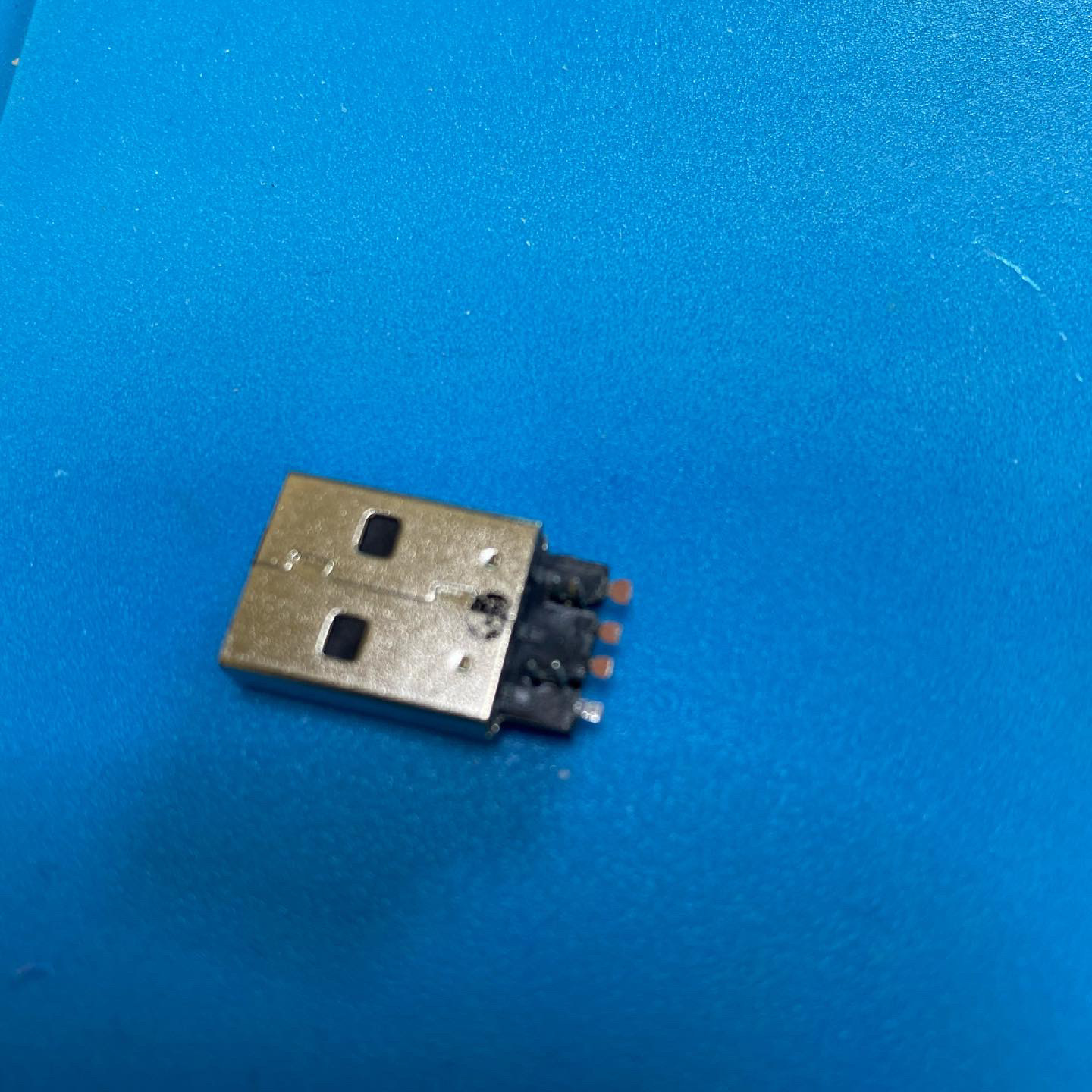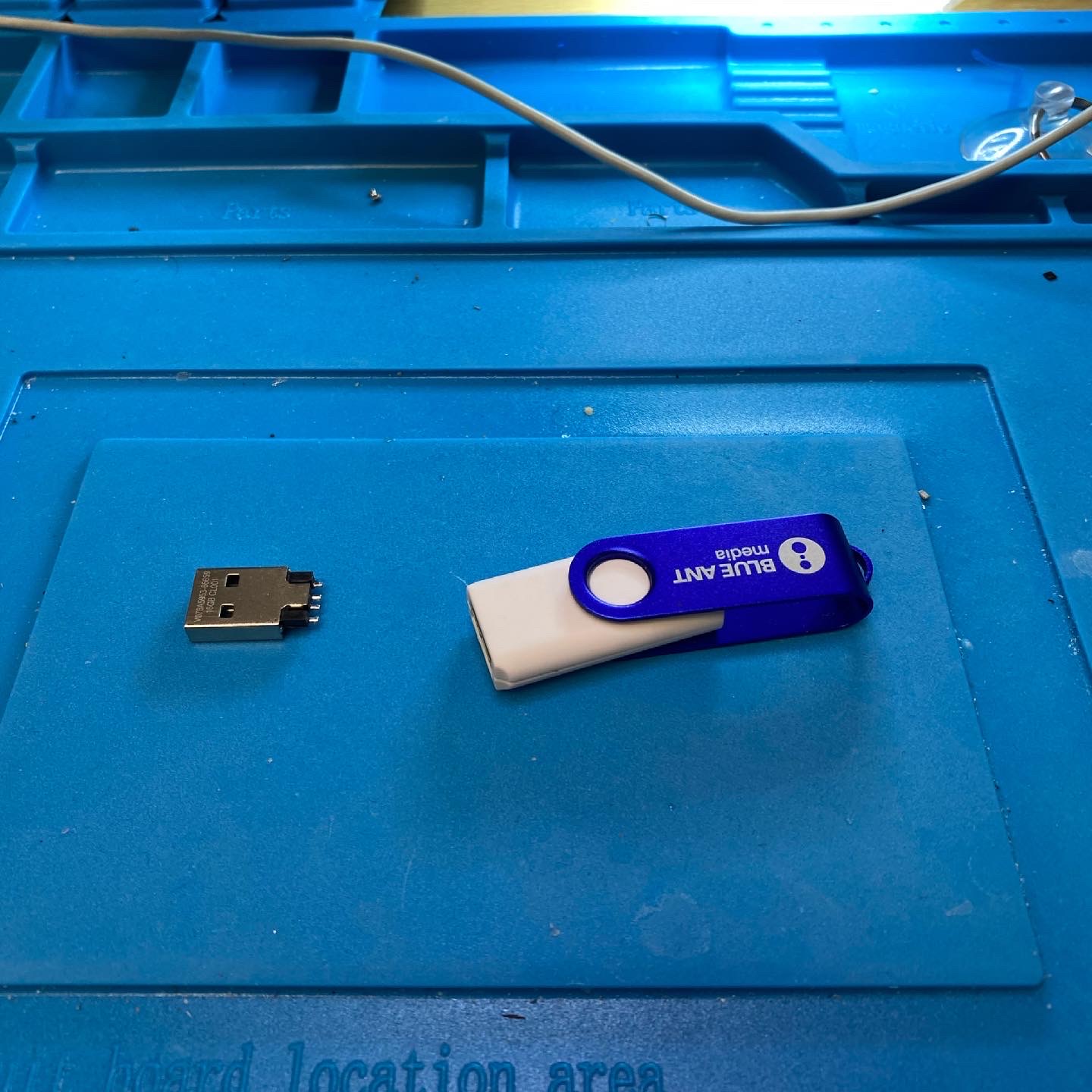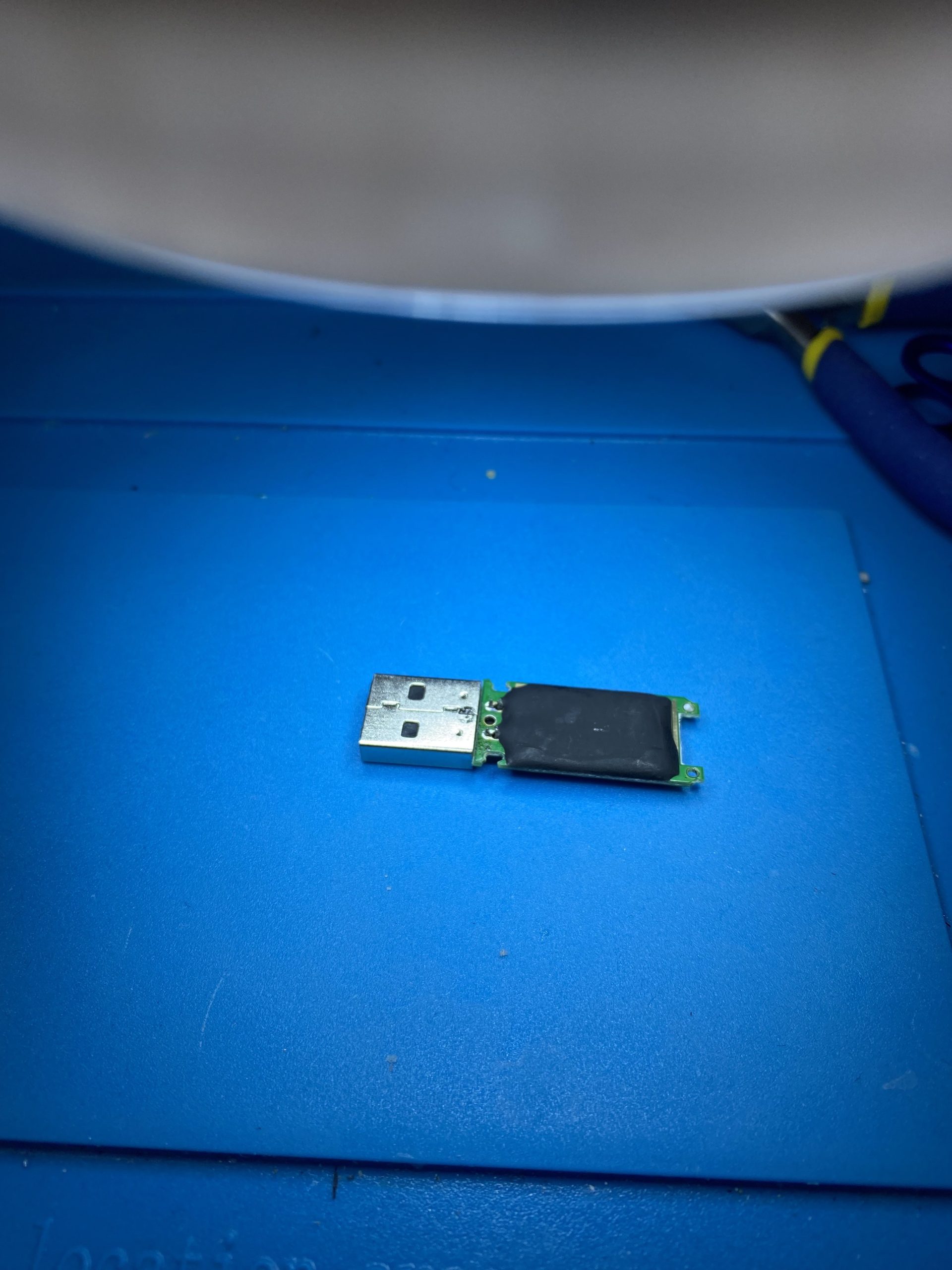Data Recovery
A: Yes, but it depends on the extent of damage to the electronic components within the thumb drive.
In many cases, we can solder the connector back onto the thumb drive, ensuring the traces (microscopic conductive lines) remain intact and electronic components undamaged. This allows us to retrieve data from the flash drive by repairing the existing connector or attaching a new one to the damaged traces.



For Thumb drive Data Recovery, OmniDataPlus has the tools and expertise to assist you. Contact us at (647) 490-4144 for a free consultation, or visit us at 61 Alness St, Unit 208, North York.
You can also visit the MAIL-IN section on this website for instructions on sending your drive for Data Recovery services
A: Yes, success depends on several factors, unfortunately with a relatively low success rate.
SSD Data Recovery differs significantly from HDD Data Recovery. While SSDs are electronic and may seem more reliable, this is a common misconception. SSD failures often occur without warning, lacking the audible indicators (like clicking or buzzing) associated with HDD failures. These failures can go undetected for long periods until the drive suddenly stops working, leaving no opportunity to retrieve data beforehand, unlike HDDs that often show signs of impending failure.
SSD failures can be detected if you are technically inclined and know where to look for indicators within your system.
SSDs store data using NAND chips, where cells degrade over time due to limited charge cycles. This degradation can lead to data loss and drive failure.
A critical factor for SSD Data Recovery is TRIM. Unlike HDDs, SSDs rely on TRIM to optimize performance by clearing NAND cells of deleted files. Once TRIM executes, recovering deleted files becomes impossible.
SSD controllers, especially newer models, encrypt data stored in NAND chips. This encryption adds complexity to data recovery efforts in case of controller issues, making recovery more challenging and time-consuming.
So Can I get my files after I deleted them ?
Recovering data from an SSD is rarely possible if TRIM has cleared the NAND cells. Specialized tools may help prevent this, but once TRIM executes, recovery is usually impossible because the data charges are cleared, making file reconstruction nearly impossible. Continued use of the drive after data loss further reduces recovery chances.
For SSD Data Recovery, OmniDataPlus offers the tools and expertise you need.
Contact us for a free consultation at (647) 490-4144, visit us at 61 Alness St, Unit 208, North York, or visit our website’s mail-in section for instructions on sending your drive for recovery services.
A: YES, you can, but it depends on several factors.
The success of data recovery depends on factors such as the drive make and model, storage size, and any unusual noises. Failures are categorized into logical, disk-level, and drive-level issues, each with varying chances of success and associated costs. Logical failures are typically easier to resolve, whereas recovering data from drive-level failures requires specialized tools and expertise, resulting in higher recovery costs.
Accidental file deletion or drive formatting are common in logical data recovery. Mechanical failures, indicated by clicking or screeching noises, require extensive rebuilds and incur higher costs.
Around 40% of cases involve logical drive failures, followed by 40% for disk-level issues, and 20% for drive-level failures. Many shops offer logical recovery but lack tools for disk and drive-level recoveries, often outsourcing without consent, leading to higher costs and privacy concerns.
At OmniDataPlus, we specialize in all three types of failures and provide comprehensive Data Recovery services. Your privacy and Data Security are our top priorities.
Contact us by phone at (647) 490-4144 or visit our location at 61 Alness St, Unit 208, North York, from 9AM to 5PM, Monday to Friday.
You can also visit the MAIL-IN section on this website for instructions on sending us your laptop or hard drive for evaluation.
A: Yes, there is a risk for data loss as your laptop’s internal hard drive has most likely mechanically failed.
We recommend taking your laptop to a specialized data recovery shop that can handle these issues. These shops have the expertise and tools needed to assess and potentially recover data if necessary. Clicking noises typically indicate a mechanical failure in the internal hard disk. Continued attempts to power it on could further diminish data recovery chances.
At OmniDataPlus, we specialize in comprehensive Data Recovery services. Our fully-equipped laboratory handles everything from logical recoveries (accidental formatting and file deletions) to the meticulous process of safely Extracting Data from opened hard drives.
Contact us at (647) 490-4144 for advice on retrieving your critical data. You can also visit us at 61 Alness St, Unit 208, North York, Toronto, from 9 AM to 5 PM, Monday to Friday, or initiate a remote repair through the MAIL-IN section on this website.
iPhone/Samsung Data Recovery
A: NO
Apple’s primary focus is not on recovering your valuable data, such as photos, from your device. Their service approach aims to generate revenue, often prioritizing device replacement over data recovery. Apple may suggest data retrieval is impossible to encourage device sales, rather than addressing underlying issues with your device directly
At OmniDataPlus, we specialize in extracting data from iPhones, iPads, and MacBooks. For newer devices, your photos, videos, and documents are encrypted in the device’s memory. Our process involves restoring your device’s functionality and entering your screen password to recover your data. Our goal is to fully restore your device to a secure state, enabling us to transfer your data to a USB drive promptly and securely.
For data extraction from your iPhone, iPad, or MacBook, contact us at (647) 490-4144 or visit our lab at 61 Alness St. Unit 208, North York. You can also initiate a remote service by visiting the MAIL-IN section on our website. We’re dedicated to exploring the best options to recover your data
A: YES, you can
When electronic devices get wet, simply drying them isn’t sufficient. Water and liquids contain chemicals that, combined with electricity, cause oxidation similar to rust. This process continues even after drying, leading to eventual malfunctions and complete failure if untreated. Putting your phone in rice isn’t effective. Promptly opening, drying, and professional treatment are recommended to increase chances of successful Data Recovery. At OmniDataPlus, we specialize in such cases, offering tailored strategies for Data Recovery needs without unnecessary component replacements.
A: YES
Recovering Data from a non-functional phone is often possible, depending on the issue. However, if critical components like the NAND or CPU are damaged, recovery may not be feasible. In many cases, the problem is simpler, such as a faulty charge port, screen, or battery. Sometimes, more complex logic board work is required, which we can perform to restore functionality. Using advanced electronic repair techniques like micro-soldering, we can often revive your phone and recover your data.
A: YES, you can retrieve your data
We have the tools and expertise to resolve Error 1110. DFU mode (recovery mode) and attempting to flash the iPhone with iTunes will result in Error 1110 and won’t resolve the issue. This bug in the iOS software prevents successful updates, and Apple cannot recover your data; they may offer a device upgrade or refurbished unit instead. However, if your photos and memories are important, we have the capability to help you retrieve them
If you need to Recover Data from your iPhone, OmniDataPlus has the tools and expertise to assist you. Contact us for a free consultation at (647) 490-4144, visit us at 61 Alness St, Unit 208, North York, or go to the MAIL-IN section on this website for instructions on how to mail in you iPhone for retrieving your iPhone photos and memories
